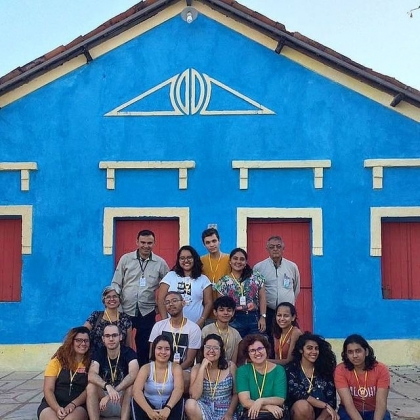A career committed to social transformation

A career committed to social transformation
Inspired by her parents from an early age, Professor Andrea Pinheiro built a career in popular communication and educommunication based on her experience of faith and human relationships. Luis Henrique Marques *
The journalist and professor Andrea Pinheiro Paiva Cavalcante, a professor at the Federal University of Ceará (UFC), has an intense history of relationship with popular communication and educommunication. For her, the first "culprits" of this are her parents. His father was the founder of the Pastoral Land Commission and his mother, the founder of the Central Única dos Trabalhadores (CUT) in Ceará. "My entire career has a lot to do with this coexistence, from an early age, with social movements and the Church," he says. She explains that when she decided to study social communication, it was natural to get involved with the popular segments, which ended up defining her performance as a professional communicator and, later, as a teacher and researcher.
.jpg)
In fact, while still having a degree in social communication, he participated in the Base Ecclesial Communities (CEB) in Fortaleza. At that time, he produced the daily Nosso piso , a communication project in alliance with the Comboni priests, an activity that allowed him his first experiences in the training of popular communicators. The experience advanced to the field of radio, whose production was also linked to popular and union movements. Andrea even worked with community radio stations for speakers.
Over time, he also participated in the experiences of the neighborhood newspapers and the NGO Comunicação e Cultura, when, once again, he worked in the training of popular communicators from the outskirts of Fortaleza. Andrea explains that, from these first experiences, as well as her initial readings, they were based on dialogic communication. "This is in line with my experience as a Christian woman, who believes in social justice and transforming the world through faith-driven communication."
It was also with this perspective that, in the 1990s, he became involved in the constitution of the network of solidarity communicators of the Brazilian Christian Union of Social Communication (UCBC) that acted in favor of the Pastoral da Criança in Brazil. "I owe a lot to this collective work experience, because it helped me learn how to contribute to enhancing those experiences, expanding other voices and involving other subjects in the production of their own communication."
He says that, during that period, he traveled throughout the country, promoting radiocommunication workshops for leaders of Pastoral da Criança, with whom he talked about the social function of communication and how these popular communicators could contribute to helping the care of their children. communities. . In fact, Andrea emphasizes saying that her professional and academic career is always the result of a collective work built through relationships with different actors.
Teaching and research
Still in the 1990s, shortly after graduation, she was approved to assume the role of substitute teacher in the UFC communication course, when she took up the discipline of Community Communication. It was the "rehearsal" of what would become his teaching career. He says that, on the occasion, he systematized his experiences and readings to present them to the university students regarding the communication that took place in the periphery. "There was a very strong communication network, articulated between the movements, but it had no visibility outside of that circuit," he explains.
But it was in 2000 (married and with her first child) that Andrea definitely started her teaching career at a private university. Although she worked in the Advertising course, the teacher continued to encourage and guide her students to produce productions focused on community and popular communication, especially in the area of radio and with a particular focus on children's rights.
It is also from that moment when she acquires ingenuity as a researcher. He currently coordinates the Research Laboratory on Children, Youth and Media Relations, which has existed for 15 years. Among the group's initiatives -which unites research and extension- is the work developed with the network called CUCAs (Cultural Spaces for Youth), whose educommunicative approach is carried out in the use of the internet, such as working with content against hate speech .
Based on her experiences and learning, Professor Andrea Pinheiro highlights the need to think about inclusive communication in all directions. “So, in a community where there are Catholics, Evangelicals, and religions of African origin, it is necessary to work with all these segments, valuing the richness that each of these groups learns from them and does not impose their vision, in such a way that their religious perspective, ”he argues. "We work more listening to the community, producing and building together all these processes that are the basis of educommunication, of this more horizontal communication, which presupposes dialogue and participation."
Consult, in the next articles in this section, some of the educommunicative activities coordinated by Professor Andrea Pinheiro.
* The author is a journalist, editor-in-chief of Cidade Nova magazine and secretary of SIGNIS Brazil.






